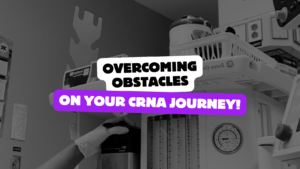Here is another nugget about myself. Way back before I became a CRNA, I received a degree in electro- mechanical engineering. I know you are counting on your fingers how many degrees I truly have. I know I get asked that all the time. Yes! I am a lifelong student and am proud of it.
Today is the perfect day to talk about something I learned way back when I was in engineering. And that would be reverse engineering. But how does that apply to becoming a CRNA today, you ask? Well, actually it can be applied to anything in life. And is arguably the smartest and easiest way to accomplish any goal.
Read: How To Become A Certified Registered Nurse Anesthetist (CRNA)
So, what is reverse engineering?
Reverse engineering is a concept used among engineers. Basically, the engineers take something like a piece of software or a component apart so they can better understand how it works in order to make it better. Another great way to explain it- they uncover as much information as possible about the product or design elements, eliminate what they don’t want and make the product even better than before.
While this concept is very common in engineering, chemicals and electronics to name a few. As I just stated it can also be applied to everyday life. No I am not suggesting you study engineering before becoming a CRNA like I once did. But applying the concept of reverse engineering will help you figure out how to become a CRNA.
I know it sounds complicated, right? Well it doesn’t have to be. It’s actually quite simple. And the whole process can be broken down into 5 steps. Let’s say your goal is to be accepted into a CRNA program next year. I know that sounds near impossible to you right now. Believe me, I understand because I once felt the same way. But I did it and so can you!
But first you must reverse engineer your goal. From there it becomes more doable. Especially when you break it down into more manageable steps. Here are the steps I promised:
Determine the end goal
First, you have to be absolutely certain you want to become a CRNA. Understanding your “Why” will allow you to stay motivated and pursue your goals no matter what.
Then you can get specific and clear on what it will take for you to become a CRNA. What is your GPA? Do you need to repeat some science courses? Are you getting great critical care experience in your current unit? If not, do you need to transfer? Are you applying to CRNA school the next cycle?
Also, don’t just say I want to be a nurse anesthetist in the future. Begin speaking positive affirmations over your life and come out the gate saying “I will be accepted to a nurse anesthesia program by 2021”.
Need to do the research
Next, figure out exactly what it will take for you to be a CRNA. Do your research and find out exactly what the nurse anesthesia program which you are applying requires. While you may not be able to get all the specifics, it’s not hard in the social media and information age to find people who were accepted to those programs and what attributes they possess. Going one step further, it is not hard to find other CRNA s who were where you are right now to mentor. And believe me they are willing to help you navigate this journey.
Of course, the researching multiple programs may be tedious but it will be worth it in the end. Take notes on what you will need from each school. You could easily create an excel sheet to compare CRNA programs with categories like program name, location, tuition, program director, prerequisites, notes section, etc. Feel free to download this one I created for you here.
Determine exactly where you are
So, where are you at right now? This is your starting point. You may be thinking it doesn’t look like much. But that is alright. Even when you think it isn’t I can assure you that you have some skills already within you. So you are never completely starting from ground zero.
I want you to sit down and list all your accomplishments and achievements. Put down everything you’ve done since undergraduate nursing. Also be sure to include your volunteering, shadowing of CRNAs, and professional organizations. Even if you had a horrible memorable experience during shift as an ICU nurse? Write it down too. You never know when you will need to draw upon this experience. It may make for either a great personal statement or interview for nurse anesthesia school.
All this will help you on your journey to become a CRNA, even if you are not sure it will matter. Remember, your whole life has been preparing you to become what you desire.
List all the steps then reverse the order
Now here is the fun part. Take the end point of your goal which is to become a CRNA and work backwards. Depending on where you are in the process, becoming a CRNA in reverse order may look something like this:
- Focus on sciences and get good undergraduate grades.
- Complete Bachelor’s degree nursing!
- Pass RN- NCLEX exam
- Research CRNA programs
- Work in the ICU
- Save money
- Take pre- reqs
- Get a great GRE score
- Shadow a CRNA/ Volunteering
- Get CCRN certification
- Gain leadership experience
- Prepare for an interview
- Submit application
- Interview for program
- 3 years of CRNA school
- Graduate from CRNA school
- Pass NBCRNA Board Exam
- Now a CRNA!!!
I know! This looks like a long to do list. But I like to call these simple micro goals or priorities broken down into more manageable chunks. As you look at this list try to focus on the one task at hand so you are not completely stressed and discouraged.
Create your plan of attack
Based on your simple micro goals, create an action plan. Get your free action plan here. These are simple goals because they are vague, open- ended, can’t be measured and have no specifics. This is not what you want. So go one step further and turn these simple goals into SMART goals. Remember actionable steps begin with SMART goals. I know I mention this a lot but it is really important. SMART goals need to be specific, measurable, achievable, realistic and timely in order to increase your chances of being successful in its completion. As you begin to tackle these actionable steps be sure to monitor your progress as you go.
For example, I know it is easy to say I want to get my CCRN certification. But try going into more detail using the SMART goals technique. Instead say “I will attain my CCRN certification by December 2020 by studying everyday and completing a one CCRN prep course”. Also making an “I will” statement makes it more powerful. This sets you up for success, motivates you and keeps you focused on the end goal.
Read: Stay Motivated On Your Journey With These Easy Steps
Stay the course and make it happen
Once your plan is laid out, the only thing to do is to get it done. I know it sounds simple coming from someone who is already a CRNA. But I believe this is the part that trips most people up. I know because I have been there! I was once trying to figure out how I would go from being a resident assistant in a nursing facility to today as a CRNA. I did it by taking simple micro goals and breaking them down into SMART goals. And yes- it took me 13 years but again everyone’s journey will be different.
I hope you will not only reverse engineer your way to become a CRNA, but use it as a tool in all areas of your life. Remember, you need to set SMART goals in order to be successful and motivated to stay the course on your journey to become a CRNA. Now, take a deep breath, commit to the process and let’s get to work tackling your actionable goals. If you are still here reading this, I believe you have what it takes! Stay the course, and become a CRNA.
P.S. If you are new to The CRNA Chase, welcome. I am so glad you are here. To get the most out of this site, check out my Start Here page to get more insight into who I am and why I started this blog. Plus, you can dive more into being a CRNA with much needed information on personal growth, professional development and financial literacy. Also, please help yourself to some gifts in the Free Resource Library.







